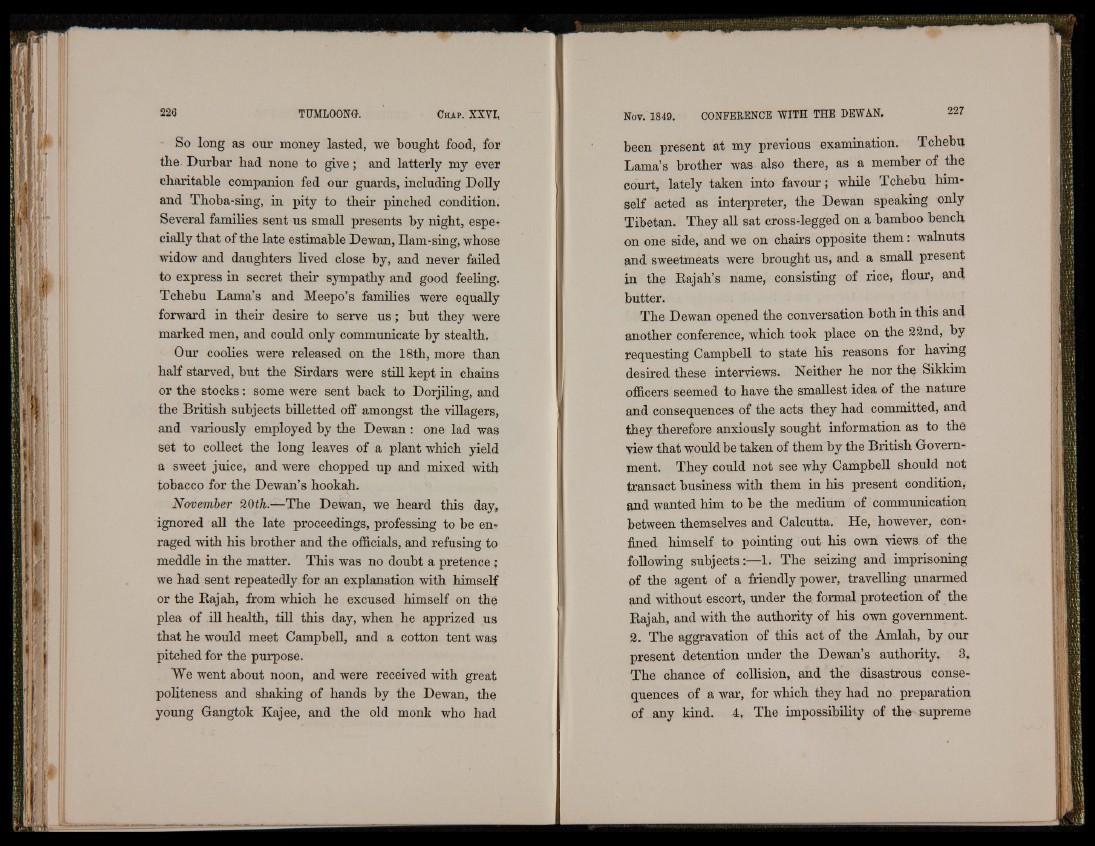
So long as our money lasted, we bought food, for
the. Durbar had none to give; and latterly my ever
charitable companion fed our guards, including Dolly
and Thoba-sing, in pity to their pinched condition.
Several families sent us small presents by night, espe-
cially that of the late estimable Dewan, Dam-sing, whose
widow and daughters lived close by, and never failed
to express in secret their sympathy and good feeling.
Tqhebu Lama’s and Meepo’s families were equally
forward in their desire to serve u s ; but they were
marked men, and could only communicate by stealth,
Our coolies were released on the 18th, more than
half starved, but the Sirdars were still kept in chains
or the stocks: some were sent back to Dorjiling, and
the British subjects billetted off amongst the villagers,
and variously employed by the Dewan: one lad was
set to collect the long leaves of a plant which yield
a sweet juice, and were chopped up and mixed with
tobacco for the Dewan’s hookah.
November 20th.—The Dewan, we heard this day,
ignored all the late proceedings, professing to be en*
raged with his brother and the officials, and refusing to
meddle in the matter. This was no doubt a pretence;
we had sent repeatedly for an explanation with himself
or the Rajah, from which he excused himself on the
plea of ill health, till this day, when he apprized us
that he would meet Campbell, and a cotton tent was
pitched for the purpose.
We went about noon, and were received with great
politeness and shaking of hands by the Dewan, the
young Gangtok Kajee, and the old monk who had
been present at my previous examination. Tchebu
Lama’s brother was also there, as a member of the
court, lately taken into favour; while Tchebu him*
self acted as interpreter, the Dewan speaking only
Tibetan. They all sat cross-legged on a bamboo bench
on one side, and we on chairs opposite th em : walnuts
and sweetmeats were brought us, and a small present
in the Rajah’s name, consisting of rice, flour, and
butter.
The Dewan opened the conversation both in this and
another conference, which took place on the 22nd, by
requesting Campbell to state his reasons for having
desired these interviews. Neither he nor the Sikkim
officers seemed to have the smallest idea of the nature
and consequences of the acts they had committed, and
they therefore anxiously sought information as to the
view that would be taken of them by the British Government.
They could not see why Campbell should not
transact business with them in his present condition,
and wanted bim to be the medium of communication
between themselves and Calcutta. He, however, con*
fined himself to pointing out his own views of the
following subjects:—1. The seizing and imprisoning
of the agent of a friendly power, travelling unarmed
and without escort, under the formal protection of the
Rajah, and with the authority of his own government.
2. The aggravation of this act of the Amlah, by our
present detention under the Dewan’s authority, 3.
The chance of collision, and the disastrous consequences
of a war, for which they had no preparation
of any kind. 4, The impossibility of the supreme